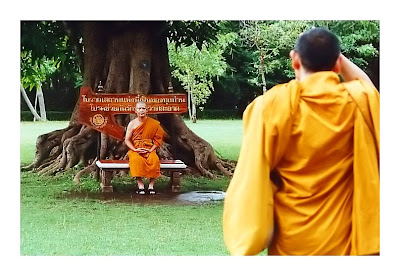
10 Ways of making merits.
In our daily life after we get up in the morning, our mind will start getting into contact with both wholesome andunwholesome events all day long. As for the intelligent ones, they will be cautious and learn all the events coming into their mind with consciousness. At the same time they will deal with each and every contact with good intention and good deed as this is a way to cultivate merits (or in Buddhism, we call “Boon”) in their minds. There are 10 ways of making merits with details as follows:
1. If we are in a position to help others to complete their jobs which are right to do and not against good moral,do go ahead to help them without delay. This is a merit made by rendering services to others, (in Pali words, “Veyyavajjamai”).
2. Merit made by humbling oneself before others. In association with others, if we are humble to them, to our parents, teachers, bosses, colleagues, subordinates, and all sentiment beings under the wheel of life (birthand re-birth), we shall create a friendly and warm atmosphere among them. This is a way of cultivating merit (in Pali, we say, “Appajayanamai”).
3. Merit made by listening to “Dhamma” (Lord Buddha’s teachings). As you all have listened to my lecture of “dhamma” today intentively, you are considered to have cultivated a form of merit (in Pali words, “Dhammasavanamai”).
4. When we learn of good deeds and merits made by others, we have a feeling of rejoicing in the merits they have made. This is another way of making merit by rejoicing in others’ merits (In Pali, we all, “Pattanumodhanamai”).
5. When we have made any merit, like giving alms to the monks, and after we have come back home or arrived in the office, we then share our merit derived to our family members or office colleagues. We shall then get double merits for this instance. This is also another way of making merit by sharing or giving out merit (In Pali, we refer to “Pattidhanamai”).
6. Merit made by giving (in Pali, we say “Dhanamai”). When we donate things to others as well as allsentiment beings who are in need, e.g. food, clothing, medicines, etc. we are said to have contributedmaterial gifts (in Buddhism, we call “Watthu-tharn”) to them. This is a kind of merit made by us.If somebody causes you troubles, anger, worry or hurts you in one way or the other, you pay no regard toand are willing to forgive them (a common term is “forgive and forget”), you are termed to have cultivated a great merit (greater than a material gifts). (In Buddhism, we refer to “Apaiyatharn”). This is because “Watthu-tharn” is easier to make while “Apaiyatharn” is difficult to develop as it usually goes against one’s feeling and sensation. However, if you can cultivate this type of merit and make it as a part of your habit, you are considered to have duly developed your mind to a higher degree than a layman does.
7. If you can plant “wisdom” upon the mind of the others like the lecturing of “dhamma” (BuddhistTeachings) I have given to you today, it is a way of cultivating merit by teaching or showing the“Truth” to enlighten the listeners to understand life so that they can make their livings fruitfully, happilyand peacefully (in Pali, we call this type of merit “Dhammathessanamai”). This is the highest meritrecognized by Lord Buddha, much greater than “Watthu-tharn” and “Apaiyatharn”. However, I would recommend all of you to perfect your merit making by incorporating these three with the rest of them.
8. Merit made by observing the precepts or moral law (in Pali, “Silamai”). The word “sila” meansnormal - - a normal moral conduct of your bodily action and speech. For the monks or those who practise “dhamma”, it includes your thought or mind perception as well.
If you can keep your show through your bodily action and speech normally, e.g. behave well in every action you do, speak only nice and proper words to others, not to cause any trouble to or hurt others, you are said to have observed “sila”, a way of cultivating merit.Frankly speaking, the “sila” generates from your mind. If you can keep your mind in a normal and peaceful state, not to cause any worry or trouble to other people, you are said to have cultivated merit in yourself.
9. Merit made by mind development (in Pali words, “Bhavanamai”) The way of developing one’s mind by concentratingon a particular word while inhaling and exhaling like “Bud-Dho” or “Samma-Arahant” or by paying attention to the rising and falling of one’s abdomen, is a method of cultivating merit. This is to perfect our mind with all the good deeds - - filling in the mind with new wholesome acts or develop further any existing good deeds to its peak. This is a means to mind development and an amazing method to cultivate our merit.
10. Merit made by having a correct view (in Pali, we call “Dhitthuchukam”) This is the last but not least way of making merit. From the time we get up until the time we go to bed again, our mind will get in touch with contactcoming to our eyes, ears, nose and body contact, both wholesome and unwholesome, and thus our mind will create volitional activities and form various feelings. If we are conscious and mindful at each and every moment of contact, and see its true nature as coming into existence and fades away, we can then manage and resolve any problem that may arise. In other words, our mind will stay calm no matter it receives good or bad contact/feeling. This is how our mind forms a correct view (“Dhitthuchukam”) on all events coming into our lives.

No comments:
Post a Comment